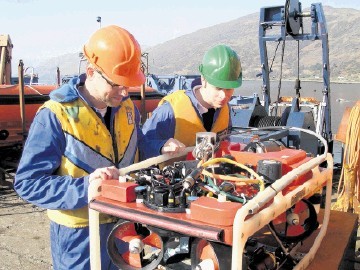
Remotely operated vehicle (ROV) training is driving activity at Fort William’s Underwater Centre – and not just in the UK.
The centre has seen increasing demand for its ROV training at its Loch Linnhe base – from both students and prospective employers.
Now it is looking to introduce ROV training at its Tasmania, Australia, base and another as yet unnamed location outside the UK.
In addition, the centre is looking to invest £5milion over the next four years at Fort William – its base since 1975.
It has also formed a partnership in the UK with subsea firm Unique System, to give the centre a “shop window” in Aberdeen.
General manager Steve Ham said, since the Underwater Centre was bought out of receivership in 2004, £3million had been invested in facilities, but on an ad hoc basis.
The new cash, support by Highlands and Islands Enterprise, would be more structured – on diving and ROV equipment, onsite facilities, including dive site objects and tools, and new courses.
One of the key areas being invested in will be the closed bell diver training, he said.
“We have got a safe system but to take it up to a best level of practice in the industry we need some investment,” he said. “We also need some investment in buildings around the pier.”
The firm trains about 80 closed bell divers a year, more and more of those sent from international firms.
Its biggest area, air diving, seeing 100-120 trained a year, has seen a lowering in demand, especially in terms of UK nationals joining the course at fewer than 50% of delegates – thought to be due to a delayed effect of the economic downturn and lack of access to bank loans for those thinking about doing the course.
Demand for ROV pilots, however, has been on the increase, with about 80 a year trained, matched by a high placement rate. Subsea trials is also a growing part of the business.
The additional investment will also see additional tools training added, continuing an investment in tools already started, and a new ROV fibre optics course introduced.
Where further cash is spent will be worked up with industry, said Ham – admitting that perhaps in the past the centre has not had as much focus as it should on what employers were wanting, as historically most custom came through individuals seeking to get into the industry.
Now fewer of the individuals are British – at less than 50% of all delegates – and firms, especially internationally, were taking more of a role in training in order to control competency.
“The main thing for us is to work much more closely with industry to deliver the training they need,” he said.
The centre is projecting overall revenues of £6million in 2012, 35% up on last year but following a low base due to the depressed numbers on air diving courses due to the bank loan constraints. Fort William would account for about £4million of the total figure.